
The biggest 2023 ecommerce trends for online sellers
ecommerce trends 2023 – the official list
This guide to trends in 2023 brings you the latest insights into the rapidly evolving online selling landscape. As an online seller, staying abreast of the latest trends and leveraging them to stay ahead of the competition is crucial. In 2023, we expect to see some exciting developments impacting sellers and customers.
With the rise of AI-generated content, pricing pressure, and social commerce, it’s more important to differentiate your products and provide personalized experiences that resonate with your target audience. Moreover, emerging technologies like AR and VR are set to transform the online shopping experience, while sustainable and ethical shopping practices will continue to gain momentum. As an eSeller, knowing these trends can help optimize your sales strategy, attract and retain loyal customers, and drive revenue growth.
When it comes to achieving growth, businesses face two significant hurdles: acquiring new customers and building the capacity of their team. To help you tackle the first obstacle, we’ve enlisted the expertise of our Growth CFOs, who work closely with marketing professionals to develop winning strategies for ecommerce success.
As technology continues to drive the world towards greater digital connectivity, the online shopping sector is experiencing unprecedented growth. In 2020 alone, global ecommerce sales reached an impressive $4.2 trillion, with projections indicating a continued upward trend. To stay ahead of the game in such a dynamic industry, keeping up with the latest trends shaping the ecommerce landscape in 2023 and beyond is essential.
If you’re an online seller looking for a fast and secure way to receive international payments, look no further than our flexible payment solution. Payoneer makes it easy for ecommerce sellers like you to get paid from top marketplaces worldwide, so you can focus on what you do best – growing your business.
I'm ready for easy Payments from online marketplaces!
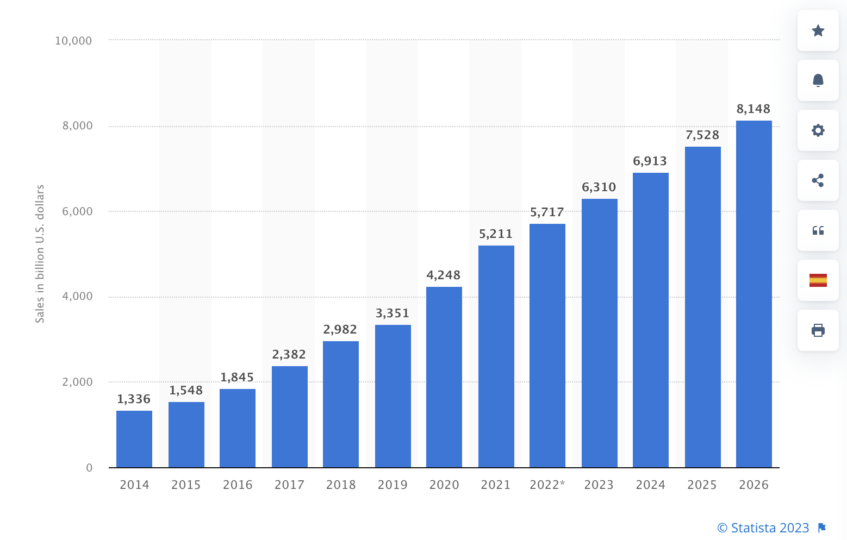

Source: Statista retail ecommerce sales worldwide from 2014-2026
Global sales were around 5.2 trillion USD in 2021 and are projected to reach 8.1 trillion USD by 2026. China’s market is the largest, while the UK, South Korea, and Denmark have the highest percentage of online retail sales. Amazon is expected to surpass Alibaba in sales by 2027. Emerging markets include the Philippines and India, where sales were forecast to grow by over 25 percent during 2022.
As we look ahead to trends 2023, the global online retail sales forecast is expected to hit a staggering $5.6 trillion. With the industry continuing to surge and representing approximately 20.8% of total retail sales worldwide, staying abreast of the latest trends in the space is vital to remain competitive.
The industry was heavily impacted by the COVID-19 pandemic, causing a rapid acceleration in online shopping habits, and these new behaviors are here to stay. As such, the demand for solutions and services is on the rise, creating opportunities for businesses across the globe.
We know that countries like China and the US have long been at the forefront of growth. Still, other markets, such as Japan, Germany, and the UK, are now tapping into the benefits of ecommerce as a significant revenue stream. Ecommerce continues to revolutionize how we shop and do business, and staying ahead of the curve is crucial to seize growth opportunities and driving business success.
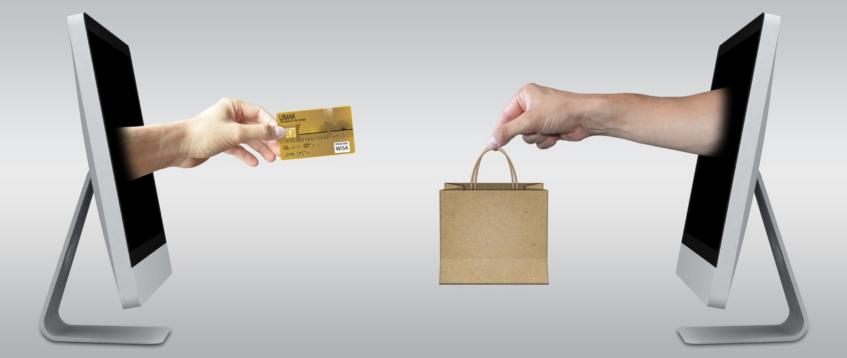

The top ecommerce trends 2023 to keep an eye on
Ecommerce and social media trends are converging, and US sales are projected to reach 31% of total retail sales by 2026. As consumers shift their preferences to online shopping for convenience and ethical alignment, managers and marketers must keep up with the latest trends to stay ahead. Success in ecommerce depends on understanding evolving consumer behaviors and positioning your brand accordingly for optimal impact.
As online shopping continues to grow, with 2.64 billion people participating, retailers require innovative technology to provide an exceptional omnichannel retail experience. Gartner’s 2023 strategic technology trends offer valuable insights for retailers to achieve their business goals, including revenue growth and brand building.
The ecommerce trends 2023 focus on optimizing operations, scaling, pioneering new approaches, and implementing sustainable technologies, making it a highly anticipated release in the industry. As always, we have prepared a comprehensive breakdown of the Gartner technology trends for 2023, along with actionable advice for applying these trends to , omnichannel retailing and other aspects of a successful retail business.
If you’re an online seller looking for a fast and secure way to receive international payments, look no further than our flexible payment solution. Payoneer makes it easy for ecommerce sellers like you to get paid from top marketplaces worldwide, so you can focus on what you do best – growing your business.
I'm ready for easy Payments from online marketplaces!
AR/VR active user devices are on the rise
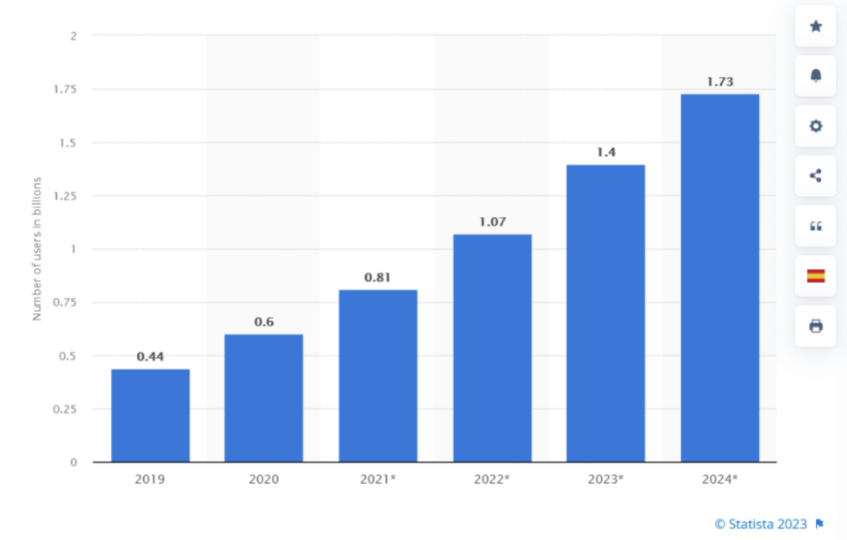

Source: Number of Mobile Augmented Reality (AR) Active User Devices Worldwide from 2019 – 2024
Increased AR adoption in ecommerce allows customers to feel like they’re physically interacting with products while shopping online. AR helps customers visualize how products will look in their homes or on their bodies, improving the shopping experience and leading to more informed purchasing decisions and fewer returns. Six exciting AR shopping trends to keep an eye on in 2023 include:
- Customizable shopping: AR/VR lets customers personalize their shopping experience by visualizing products in various colors, styles, and configurations.
- Virtual fitting rooms: AR/VR technologies create virtual fitting rooms, allowing customers to try on clothes and accessories virtually and reducing the need for physical try-ons and returns.
- In-store AR/VR: Retailers can use AR/VR technologies to enhance the in-store experience, allowing customers to interact with products more engaging and immersively.
- Product information: AR/VR provides more accurate and detailed product information, such as size, dimensions, and material, to aid customers in making informed decisions.
- Customer engagement: AR/VR creates immersive and interactive experiences that keep customers engaged and interested, leading to higher conversion rates.
- Gamification: AR/VR adds gamification elements to the shopping experience, making it more enjoyable and rewarding for customers.
Artificial intelligence is enabling custom shopping experiences
Artificial intelligence is growing fast with the rise of custom shopping experiences. AI collects data on customers’ shopping behaviors, such as browsing preferences, purchasing behavior, and time of purchase, which brands use to offer personalized shopping experiences. AI can also be used to provide efficient customer service by composing responses for more practical customer care engagements.
If you’re an online seller looking for a fast and secure way to receive international payments, look no further than our flexible payment solution. Payoneer makes it easy for ecommerce sellers like you to get paid from top marketplaces worldwide, so you can focus on what you do best – growing your business.
I'm ready for easy Payments from online marketplaces!
Mobile shopping is accelerating in 2023
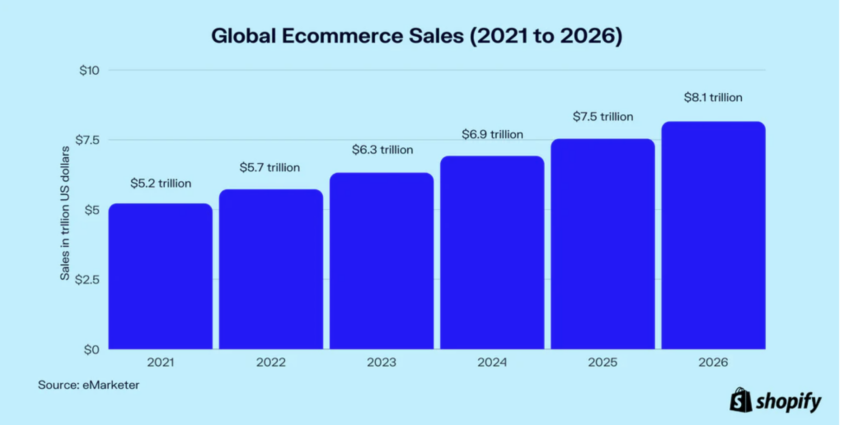

Source: eMarketer Global Sales (2021 to 2026)
Mobile shopping is not just limited to buying products but includes all activities related to mobile browsing, mobile ads, and engagement with sales reps. In addition, integrating mobile shopping with other popular features like augmented reality shopping, live stream shopping, and in-app purchases will accelerate its usage in 2023.
The evolution of social commerce
As consumer behavior and purchase decisions become more complex, social commerce rapidly evolves. According to Sprout Social’s Social Shopping report, in 2022, 98% of consumers planned to purchase social shopping or influencer commerce. This represents a significant increase from 2021 when the number was 84%.
The rise of creator marketing has resulted in platforms like Instagram and TikTok providing tools to help creators and companies sell products to consumers. To take advantage of this trend, brands should identify the most engaging social shopping platform and offer exclusive in-app discounts to attract consumers.
With this trend showing no signs of slowing down, social commerce is expected to become an even more integral part of the landscape in the years to come.
Zero-party data and privacy are top of mind
While some consumers seek personalized experiences, others prioritize their data privacy. Brands are now adopting zero-party data and collecting customer data in-house, directly from consenting customers. Marketers need to find the balance between personalization and data/privacy concerns by identifying and implementing appropriate security and privacy protocols and transparently communicating with customers about their data use.
The rise of ecommerce marketplaces
The COVID-19 pandemic brought about a massive shift towards ecommerce, and marketplaces were at the forefront of this revolution. In 2020, Amazon emerged as the biggest winner, registering unprecedented growth across the globe while traditional retailers struggled to keep up.
Thanks to its convenience and vast product range, Amazon is the go-to platform for over 50% of online shoppers in North America and Europe. However, regarding merchandise sold, China’s JD.com, Tmall, and Taobao are the world’s largest online marketplaces.
Although ecommerce giants like Amazon offer unparalleled convenience to their customers, they pose significant challenges for smaller businesses trying to establish a foothold in the market. Competing with these industry titans is daunting, especially for small and medium-sized enterprises seeking a viable online presence.
If you’re an online seller looking for a fast and secure way to receive international payments, look no further than our flexible payment solution. Payoneer makes it easy for ecommerce sellers like you to get paid from top marketplaces worldwide, so you can focus on what you do best – growing your business.
I'm ready for easy Payments from online marketplaces!
Mobile payments integration with us
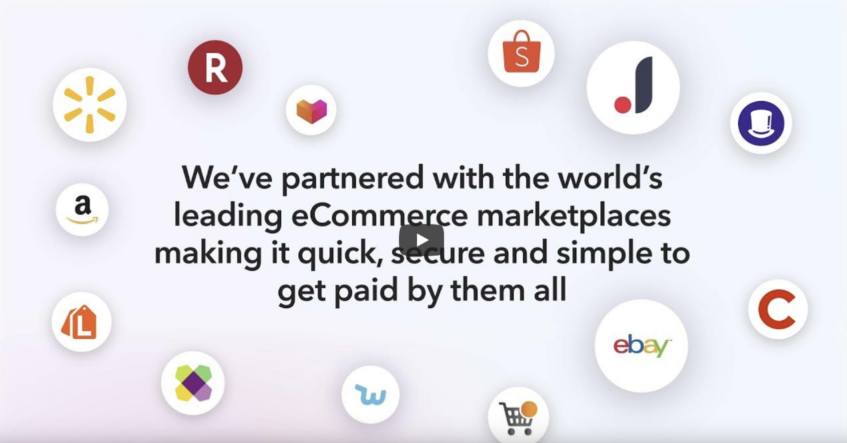

Source: YouTube Use Payoneer to Expand Your Business
Mobile payment integration is a crucial trend in mobile ecommerce for 2023. A seamless and secure mobile payment experience is essential as more people purchase smartphones. Mobile payments offer customers convenience and can increase business conversions and sales.
Shopify UAE is an example of a platform leading the way in mobile payments integration, offering options like Apple Pay, Google Pay, and PayPal. Payoneer is readily available for online sellers to facilitate seamless transactions between eSellers and customers worldwide. Plus, you can integrate us into your ecommerce platform.
It is important for businesses, especially those in specific niches like fashion or beauty, to provide a streamlined and convenient checkout process.
ecommerce trends 2023 – customization is key
A personalized ecommerce experience is a must for B2B and B2C consumers. Customers are likelier to stay loyal to retail brands that offer a personalized experience with product recommendations, custom offers, and a cohesive retail experience across various channels. Retailers with advanced personalization capabilities earn four times more revenue than those without.
Revolutionizing online shopping: tectonic shifts
We know that COVID-19 has fundamentally changed how consumers shop, accelerating the shift towards ecommerce . With the pandemic forcing many to stay at home, consumers had to rely on the Internet for everything from groceries to furniture.
This behavior change has also led to an increase in expectations. Online shoppers now demand faster checkouts, free shipping, and smoother online experiences. Brands that fail to meet these expectations risk losing customers to competitors who can provide a better online shopping experience.
Surveys show that over 60% of consumers plan to stick with online brands they discovered during the pandemic. This presents a great opportunity for businesses to build brand loyalty and turn first-time buyers into long-term customers.
While the offline market is expected to regain momentum post-pandemic, it is clear that ecommerce will continue to play a significant role in the future of retail.
Sustainability in ecommerce : a growing priority for consumers & businesses
As environmental concerns grow and the world faces a pressing climate crisis, consumers are becoming more mindful of their impact on the planet. In response, many ecommerce businesses and brands are prioritizing sustainability and ethical practices to reduce their negative impact and attract environmentally conscious consumers.
This trend is crucial for businesses that want to remain competitive and relevant in the long term. In addition, studies show that 62% of consumers consider a company’s stance on sustainability when making a purchase, and this number is expected to rise.
ecommerce businesses implement sustainable practices like eco-friendly packaging, reducing waste and carbon emissions, and sourcing from responsible suppliers. Brands also adopt ethical labor practices and support causes aligned with their values.
However, it’s not just about changing business operations. Effective communication of sustainability efforts is vital in building consumer trust and loyalty.
As consumers prioritize sustainability in their purchases, businesses and brands prioritizing sustainability and ethics will have a competitive edge. It’s a smart business move that aligns with doing the right thing for the planet.
Shifting expectations with AI chatbots: the future of trends 2023
Artificial intelligence (AI) chatbots are changing how users interact with technology, and ChatGPT is a prime example. With its advanced capabilities, users can now converse with AI bots and get exceptional results by asking questions or issuing commands.
ChatGPT was downloaded by over a million users in less than a week since its launch, and this disruptive technology is set to be a game-changer in the coming years. With ecommerce trends 2023 pointing towards the importance of personalized experiences and efficient customer service, AI chatbots like ChatGPT can provide both.
As ecommerce businesses strive to offer more personalized experiences to their customers, AI chatbots can help by collecting data on customer preferences and behaviors to provide personalized recommendations and support.
Furthermore, AI chatbots can provide efficient customer service by quickly resolving issues and answering common questions, freeing up human agents to handle more complex tasks. As the world becomes increasingly digital, AI chatbots will only become more sophisticated and prevalent, and ecommerce businesses that embrace this technology will be better positioned to deliver personalized and efficient experiences to their customers.
If you’re an online seller looking for a fast and secure way to receive international payments, look no further than our flexible payment solution. Payoneer makes it easy for ecommerce sellers like you to get paid from top marketplaces worldwide, so you can focus on what you do best – growing your business.
I'm ready for easy Payments from online marketplaces!
The rise of social customer service
Social media platforms have revolutionized the way customers interact with businesses. With the ability to connect with brands through Facebook Messenger, Instagram, WhatsApp, TikTok, Twitter, and other channels, customers expect fast and responsive service that meets their needs.
As a result, businesses need to adapt their customer service strategies to meet these new standards. This means providing support across multiple channels, including social media, and investing in AI-powered chatbots that can handle simple inquiries and free up human agents to handle more complex issues.
In addition to being fast and responsive, social customer service also needs to be personal and empathetic. Customers expect brands to understand their unique needs and preferences and offer personalized solutions addressing their concerns.
To meet these demands, businesses need to invest in training and support for their customer service teams and empower them with the tools and resources they need to provide exceptional service. This includes access to customer data and insights, as well as tools for monitoring and analyzing social media conversations.
Overall, the rise of social customer service is one of the most significant ecommerce trends 2023. By meeting the new standards for fast, responsive, and personalized service, businesses can build stronger customer relationships and drive growth and loyalty in the years ahead.
- Social media platforms are becoming more popular for product discovery and sales, with features like Shoppable Instagram enabling seamless shopping experiences.
- The sales forecast for social commerce was forecast to grow from $992 billion in 2022 to $2.9 trillion by 2026.
- Gen Z heavily relies on social media, particularly TikTok, for product recommendations, with 48% of users willing to make purchases directly from the platform.
The digital immune cybersecurity system
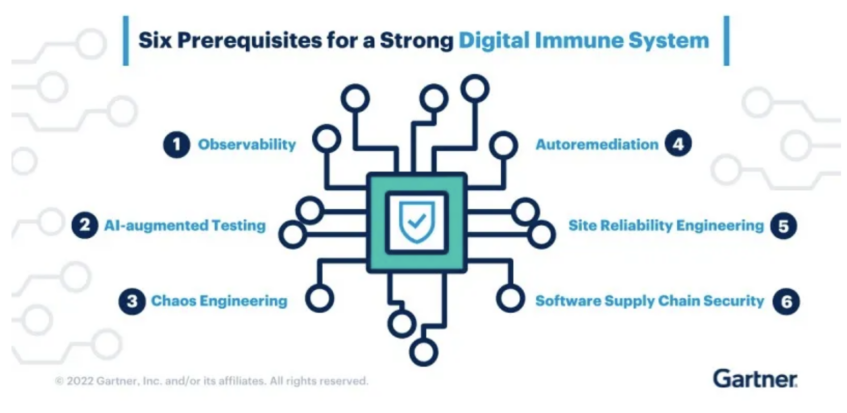

Gartner’s cybersecurity trends for 2023 include the concept of a Digital Immune System. This term refers to the combination of software and practices that a business employs to minimize risk and make its apps more resilient to failure.
For retailers with online shopping and omnichannel customer experiences, a functional app is critical. Any downtime due to software failure can result in lost revenue and customers. However, building a digital immune system can help retailers prepare for system failures and minimize the impact on the customer experience.
One company that offers support for retailers in this area is Alibaba AI & Data Intelligence, which specializes in cloud infrastructure and app testing. By working with such startups and companies, retailers can ensure their apps are tested for system functionality and resilience.
Incorporating a digital immune system into their operations can provide retailers with benefits that go beyond risk management.
By offering a seamless experience to customers, businesses can increase customer retention rates and improve their brand reputation.
- 2023 will be a crucial year for customer experience (CX) programs
- Companies will face challenges in focusing on customers amid a turbulent economy
- The character of CX teams will change, with 20% disappearing and 80% lacking essential skills
- CX work will shift from strategy to proactive service recovery
- CX differentiation will erode in three-fourths of industries
The CX tech market will shift as one-third of point solution providers get acquired by platform players. These changes will require companies to adapt their CX strategies to remain competitive.
If you’re an online seller looking for a fast and secure way to receive international payments, look no further than our flexible payment solution. Payoneer makes it easy for ecommerce sellers like you to get paid from top marketplaces worldwide, so you can focus on what you do best – growing your business.
I'm ready for easy Payments from online marketplaces!
Cryptocurrencies feature prominently in ecommerce
As we look ahead to 2023, it’s clear that cryptocurrencies will continue to make their mark on the industry. With the global shift toward digital transactions and the increasing acceptance of cryptocurrencies as legitimate payment, businesses that do not offer cryptocurrency payment options may be left behind.
However, businesses must also be mindful of the risks associated with cryptocurrencies, such as volatility, regulatory uncertainty, and security concerns. With proper planning and expertise, though, businesses can leverage the benefits of cryptocurrencies to expand their reach, reduce transaction fees, and provide their customers with a more secure and streamlined payment experience.
Powerful omnichannel experience
In today’s competitive retail landscape, offering a seamless and cohesive omnichannel experience has become more critical than ever before. Customers expect to be able to browse and shop on their own terms, using multiple devices and channels throughout their journey. In fact, studies show that shoppers who engage with retailers across multiple channels are more likely to make a purchase and spend more money than those who only shop through a single channel.
As we move into 2023, the importance of omnichannel retail will only continue to grow. In addition to traditional channels like websites and brick-and-mortar stores, retailers must also be prepared to offer innovative options like BOPIS and voice shopping to meet customers’ changing needs and preferences.
While these changes may present challenges for retailers, they offer a unique opportunity to build brand loyalty and increase customer satisfaction. By providing a seamless and personalized shopping experience across all channels, retailers can differentiate themselves from the competition and build long-term relationships with customers.
To achieve this level of integration, retailers must have a robust technology infrastructure and a deep understanding of their customer preferences and behaviors. By leveraging data and analytics, retailers can gain insights into customers’ shopping patterns and tailor their omnichannel approach to meet their unique needs.
In short, to succeed in 2023 and beyond, retailers must embrace the omnichannel revolution and make it a central part of their overall strategy. By doing so, they can stay ahead of the curve and meet the ever-evolving needs of their customers in the years to come.
Shoppers are focused on secondhand sales


Secondhand sales are becoming an increasingly popular trend in ecommerce this year. More and more shoppers are turning to online platforms to find secondhand and pre-owned items as a way to save money and support sustainability efforts. This trend is particularly strong in categories like clothing, books, shoes, and bags.
Many consumers are now heading straight to secondhand marketplaces like Poshmark, eBay, ThredUp, and Alibris to scour the online landscape for pre-loved bargains. As the demand for sustainable and affordable shopping options grows, retailers who prioritize secondhand sales and offer a seamless shopping experience for pre-owned items are likely to stay ahead of the competition.
If you’re an online seller looking for a fast and secure way to receive international payments, look no further than our flexible payment solution. Payoneer makes it easy for ecommerce sellers like you to get paid from top marketplaces worldwide, so you can focus on what you do best – growing your business.
I'm ready for easy Payments from online marketplaces!
Choose us eSellers – we’re trending in the right direction!
As we look towards ecommerce trends 2023, it’s clear that the industry is rapidly evolving, with new technologies and changing consumer preferences driving the way forward. We understand the importance of staying ahead of the curve and providing our sellers with the tools they need to succeed in this dynamic landscape.
Our payment platform is designed to help sellers seamlessly navigate the world of ecommerce, whether you’re selling on global marketplaces or at your own online store. With secure and reliable payment processing, competitive rates, and a range of payment options, we are here for you every step of the way as you capitalize on these ecommerce trends 2023 and grow your business.
If you’re an online seller looking for a fast and secure way to receive international payments, look no further than our flexible payment solution. Payoneer makes it easy for ecommerce sellers like you to get paid from top marketplaces worldwide, so you can focus on what you do best – growing your business.
I'm ready for easy Payments from online marketplaces!
Additional Sources:
- https://www.payoneer.com/industries/online-sellers/
- https://www.financemagnates.com/cryptocurrency/innovation/integrating-cryptocurrencies-in-ecommerce-opportunities-and-risks-in-2023/
- https://fastlane.com/mobile–trends-transforming-the-industry-in-2023/0/
- https://arpost.co/2023/04/11/top-5-ecommerce-ar-and-vr-trends-2023/
- https://learning.callminer.com/c/whitepaper-forrester-predictions-cx?x=CFl8z6&lx=amFxJO
- https://blog.contactpigeon.com/gartner-trends-2023/
- https://sproutsocial.com/insights/-trends/
- https://theecommmanager.com//global–trends/




